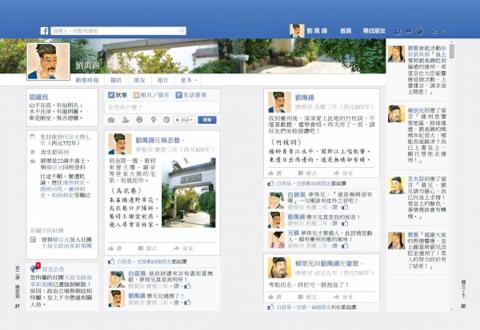A newly released literature textbook for junior-high school students has received rave reviews from netizens for incorporating social media into the study of classical Chinese (文言文).
Facebook user Yu Fan Meet (郭凡瑀) recently posted an image of a section of a Chinese literature textbook by Han Lin Publishing Co introducing Tang Dynasty writer Liu Yuxi’s (劉禹錫) classical prose-poem The Scholar’s Humble Dwelling, which was set in the format of a mock Facebook page.
Yu Fan Meet’s post has received at least 8,400 likes and been shared by other Facebook users.

Photo provided by Han Lin Publishing Co
It has also received positive comments, with one Facebook poster saying: “I would have been more willing to memorize classical Chinese with a textbook like this.”
The two-page section of the textbook for second-year junior-high students also features Liu’s other writings, with fictitious comments left by other famed Chinese literary figures, such as Yuan Zhen (元稹) and Bai Juyi (白居易).
Location tabs and personal information are included in the made-up Facebook wall.
Han Lin Publishing said it was the first time it had tried out this format.
“As the author of The Scholar’s Humble Dwelling is Liu Yuxi, the writer of the lesson at our publishing house hopes that using Facebook as a medium might bring the ancient writer closer to the lives of modern students,” Han Lin said.
While the section has already drawn a positive response online, Han Lin said it is still waiting for feedback from students and faculty, as that section would not be taught until later this semester.

Civil society groups yesterday protested outside the Legislative Yuan, decrying Chinese Nationalist Party (KMT) efforts to pass three major bills that they said would seriously harm Taiwan’s democracy, and called to oust KMT caucus whip Fu Kun-chi (傅?萁). It was the second night of the three-day “Bluebird wintertime action” protests in Taipei, with organizers announcing that 8,000 people attended. Organized by Taiwan Citizen Front, the Economic Democracy Union (EDU) and a coalition of civil groups, about 6,000 people began a demonstration in front of KMT party headquarters in Taipei on Wednesday, organizers said. For the third day, the organizers asked people to assemble

Taipei is participating in Osaka’s Festival of Lights this year, with a 3m-tall bubble tea light installation symbolizing Taiwan’s bubble tea culture. The installation is designed as a bubble tea cup and features illustrations of Taipei’s iconic landmarks, such as Taipei 101, the Red House and North Gate, as well as soup dumplings and the matchmaking deity the Old Man Under the Moon (月下老人), affectionately known as Yue Lao (月老). Taipei and Osaka have collaborated closely on tourism and culture since Taipei first participated in the festival in 2018, the Taipei City Department of Information and Tourism said. In February, Osaka represented

POOR IMPLEMENTATION: Teachers welcomed the suspension, saying that the scheme disrupted school schedules, quality of learning and the milk market A policy to offer free milk to all school-age children nationwide is to be suspended next year due to multiple problems arising from implementation of the policy, the Executive Yuan announced yesterday. The policy was designed to increase the calcium intake of school-age children in Taiwan by drinking milk, as more than 80 percent drink less than 240ml per day. The recommended amount is 480ml. It was also implemented to help Taiwanese dairy farmers counter competition from fresh milk produced in New Zealand, which is to be imported to Taiwan tariff-free next year when the Agreement Between New Zealand and

IDENTITY SHIFT: Asked to choose to identify as either Taiwanese or Chinese, 83.3 percent of respondents chose Taiwanese, while 8.4 percent chose Chinese An overwhelming majority of Taiwanese, 71.5 percent, think that Taiwan should compete in international competitions under the name “Taiwan,” a Taiwan Brain Trust survey published yesterday showed. Referring to Taiwan’s victory last month at the World Baseball Softball Confederation’s Premier12, the survey results showed that 89.1 percent of respondents said that Taiwan’s exceptional performance in sporting competitions furthers national unity. Only 18.8 percent of respondents supported Taiwanese teams’ continued use of the name “Chinese Taipei” in international sporting competitions, the survey showed. Among Taiwan’s leading political parties, the name “Team Taiwan” was supported by 91.1 percent of self-identified Democratic Progressive Party (DPP) supporters,